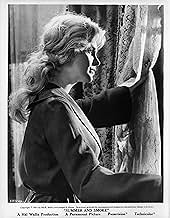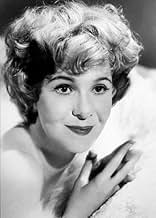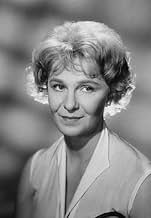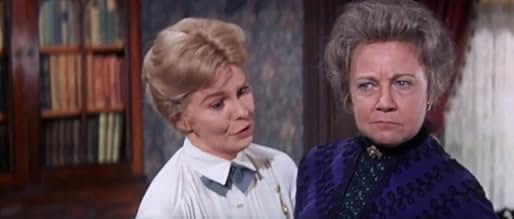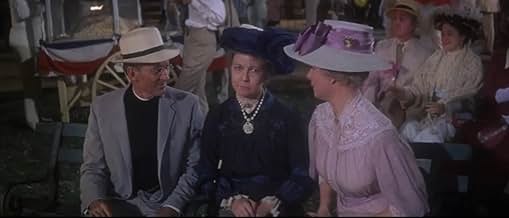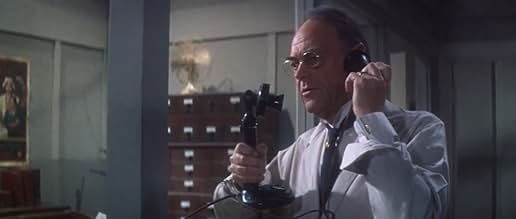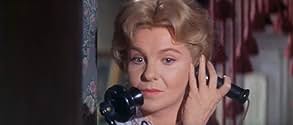IMDb RATING
6.8/10
2.2K
YOUR RATING
A plain, repressed spinster falls for a dashing young medical student who prefers the wilder life, until it's too late.A plain, repressed spinster falls for a dashing young medical student who prefers the wilder life, until it's too late.A plain, repressed spinster falls for a dashing young medical student who prefers the wilder life, until it's too late.
- Director
- Writers
- Stars
- Nominated for 4 Oscars
- 4 wins & 10 nominations total
Max Showalter
- Roger Doremus
- (as Casey Adams)
Rico Alaniz
- Knife Thrower
- (uncredited)
Cheryl Anderson
- Alma as a Girl
- (uncredited)
Lon Ballantyne
- Orderly
- (uncredited)
John Barton
- Townsman
- (uncredited)
Ray Beltram
- Cantina Patron
- (uncredited)
Marjorie Bennett
- Saleslady
- (uncredited)
Dick Bernie
- Drummer
- (uncredited)
- Director
- Writers
- All cast & crew
- Production, box office & more at IMDbPro
Featured reviews
When this was released I quickly made my way to the Fox West Coast Fine Arts Theater in Beverly Hills, California during its first-run engagement. Advance reviews were quite positive but I was unprepared for the power and yet the delicacy of Geraldine Page's performance as Alma Winemiller. Although I was never a fan of Laurence Harvey, who was cast in so many top films of that era, he joined his fellow players in affording Miss Page some very solid support. Una Merkel and John McIntire were especially worthy of praise, Earl Holliman acquits himself manfully in a brief role in the chilling final sequence, and Pamela Tiffin was touchingly beautiful as a heedless young thing. However, Rita Moreno, who has since complained about all those "spitfire" roles with which she was saddled during her earlier Hollywood days, probably counts this appearance as one of those she'd prefer we forget. (But, parenthetically, she has more than reason to be grateful for a list of credits that had already included the lovely Tuptim in the mega-box office hit, "The King and I," an Academy Award for her supporting role in "West Side Story," resulting in a career that continues to this day, outlasting many of the top stars who had led the casts of her earliest film assignments.)
Peter Glenville's direction (whose filmography is notably sparse) marshalls his actors and the top-notch production values with aplomb, aided by one of Elmer Bernstein's best scores. The VHS version does not appear to be letterboxed, thus losing cinematographer Charles Lang, Jr.'s elegant Panavision framing, which was one of this film's handsomer attributes.
Peter Glenville's direction (whose filmography is notably sparse) marshalls his actors and the top-notch production values with aplomb, aided by one of Elmer Bernstein's best scores. The VHS version does not appear to be letterboxed, thus losing cinematographer Charles Lang, Jr.'s elegant Panavision framing, which was one of this film's handsomer attributes.
Geraldine Page had her first true starring role in "Summer and Smoke" released in 1961. Yes, she had been a theatrical star and did television work, and did fine in 1953's "Hondo" opposite John Wayne. But here, Page brings the repressed Tennessee Williams character of Alma to glorious life. The story, set in the 1920's, deals with the Southern small town stifling morals of the day. Page is a preacher's daughter, making her even more repressed; her father is played by actor Malcom Atterbury with all the proper moral condemnation. Her mother, played by old Hollywood star Una Merkel, is mentally unbalanced, adding to the responsibility Alma feels, as she lives at home with both of them. Alma is at an age that would have been considered a "spinster" of the times. Enter the young handsome doctor John (Laurence Harvey), whom Alma has known since childhood, since he lives next door with his cantankerous doctor father (John McIntyre). Alma desires John, but her own sexual inhibitions will now allow her to explore that, so she secretly lusts after him. John is a fellow who focuses on the physical, and takes up with a woman who would have been considered quite loose at the time (Rita Moreno in an early performance). John knows Alma desires him, and he is not sure how to handle it. He tries to take the relationship further, but Alma resists his sexual advances. Neither of these individuals is wrong for how they feel - and they seem to go through the whole movie not connecting. This is probably the finest work Laurence Harvey did on screen - his smoldering sexuality is used here to great effect. He and Page have palpable chemistry. The supporting players are capable as well, but this is Geraldine Page's show, and her genteel demeanor and southern accent are spot on. We are left pondering Alma - she is both tragic and wonderful.
Tennessee Williams brilliant and expertly told tale of a woman and man whose moral standards or lack of standards never meet as they they both journey to opposite extremes.
The story is set in 1916. The lead role of a meticulous yet nervously self conscious reverend's daughter is skillfully portrayed by Geraldine Page. Her name is Alma, as she indicates early on, is Spanish for soul. Too highly moral minded to act on or even think of the physical acts of pleasure she exists in a fantasized world of the romanticized connection of souls. The realities of her life justify her mental escape. Her mother(Una Merkel) had a nervous breakdown some years back and is childishly stubborn. Alma to the outside observer purposely projects a maturity beyond her age as she has taken over many duties usually the responsibilities of a preacher wife. She also bears the duty of disciplinarian to her bratty, shoplifting, and childlike mother. She lives up to the responsibilities thrust upon her. Also she provides public vocal performances at special events and gives voice training lessons. In her fantasy she loves the young doctor next door with whom she grew up.
Her handsome neighbor John(Lawrence Harvey)is the son of the town doctor. He has recently finished his medical internship. He is morally the extreme opposite of Alma. He is a drinker, womanizer, gambler, and lacks any sense of responsibility. He has just returned to town and shows Alma a bit of interest but is is distracted by newest town slut Rosa Zacharius whose father owns a nearby casino featuring drinking, gambling, and what else one can only imagine. He is bewitched by Rosa(Rita Moreno). He still shows a mild interest in Alma.
He takes Alma to the Casino one night and she is horrified by the activities there. She is with John watching a cock fight and is sickened. Suddenly a spot of blood from the fighting roosters splashes on her blouse. She screams. Brilliant T.W. symbolism! The pure spinster being marked with the symbol of original sin. John and Alma walk outside to a secluded spot. They become rather excited by one another. Alma is about to give in to her physical desire but her pure and high morals overtake the moment and she runs off.
John and Rosa become engaged. One wonders why he thought he had to marry her since her character was one of the easiest conquests ever depicted.
John's father is in another part of the state treating victims of a deadly outbreak of illness as a volunteer, Alma alerts him about a wild party at his house. He returns home to find drunk people all over his property. He sees Rosa's father and starts beating the passed out man with his cane. He wakes up and shoots John's father. His father linger a few days and dies stating he does not forgive his son. Alma tells John she alerted his father to return home. John verbally assaults her with insulting dialog and blames her for his father's death.
Alma descends into deep and dark depression. Meanwhile John is shocked into the reality of the situation and takes up his father's volunteer work at the clinic. He returns a hero to take over his fathers practice as town physician.
Alma at this point has taken a dark journey. Her father asks her why she never dresses during the day and where she has been disappearing to at 2:00am. She reminds him of all the chores she does everyday and says,"what more do you want of me?" He says, "what will I tell people that ask about you?" Her startling reply is, "You can tell them I have changed. You don't yet know, how or why... but you may wish that I hadn't. The most important key scenes follow filled with amazing emotion and dialogue. Miss Page is at the top of her game in these scenes. Believe me Alma's father would have wished she hadn't changed. The final scene is lurid. Don't miss this underrated Tennessee Williams masterpiece.
The story is set in 1916. The lead role of a meticulous yet nervously self conscious reverend's daughter is skillfully portrayed by Geraldine Page. Her name is Alma, as she indicates early on, is Spanish for soul. Too highly moral minded to act on or even think of the physical acts of pleasure she exists in a fantasized world of the romanticized connection of souls. The realities of her life justify her mental escape. Her mother(Una Merkel) had a nervous breakdown some years back and is childishly stubborn. Alma to the outside observer purposely projects a maturity beyond her age as she has taken over many duties usually the responsibilities of a preacher wife. She also bears the duty of disciplinarian to her bratty, shoplifting, and childlike mother. She lives up to the responsibilities thrust upon her. Also she provides public vocal performances at special events and gives voice training lessons. In her fantasy she loves the young doctor next door with whom she grew up.
Her handsome neighbor John(Lawrence Harvey)is the son of the town doctor. He has recently finished his medical internship. He is morally the extreme opposite of Alma. He is a drinker, womanizer, gambler, and lacks any sense of responsibility. He has just returned to town and shows Alma a bit of interest but is is distracted by newest town slut Rosa Zacharius whose father owns a nearby casino featuring drinking, gambling, and what else one can only imagine. He is bewitched by Rosa(Rita Moreno). He still shows a mild interest in Alma.
He takes Alma to the Casino one night and she is horrified by the activities there. She is with John watching a cock fight and is sickened. Suddenly a spot of blood from the fighting roosters splashes on her blouse. She screams. Brilliant T.W. symbolism! The pure spinster being marked with the symbol of original sin. John and Alma walk outside to a secluded spot. They become rather excited by one another. Alma is about to give in to her physical desire but her pure and high morals overtake the moment and she runs off.
John and Rosa become engaged. One wonders why he thought he had to marry her since her character was one of the easiest conquests ever depicted.
John's father is in another part of the state treating victims of a deadly outbreak of illness as a volunteer, Alma alerts him about a wild party at his house. He returns home to find drunk people all over his property. He sees Rosa's father and starts beating the passed out man with his cane. He wakes up and shoots John's father. His father linger a few days and dies stating he does not forgive his son. Alma tells John she alerted his father to return home. John verbally assaults her with insulting dialog and blames her for his father's death.
Alma descends into deep and dark depression. Meanwhile John is shocked into the reality of the situation and takes up his father's volunteer work at the clinic. He returns a hero to take over his fathers practice as town physician.
Alma at this point has taken a dark journey. Her father asks her why she never dresses during the day and where she has been disappearing to at 2:00am. She reminds him of all the chores she does everyday and says,"what more do you want of me?" He says, "what will I tell people that ask about you?" Her startling reply is, "You can tell them I have changed. You don't yet know, how or why... but you may wish that I hadn't. The most important key scenes follow filled with amazing emotion and dialogue. Miss Page is at the top of her game in these scenes. Believe me Alma's father would have wished she hadn't changed. The final scene is lurid. Don't miss this underrated Tennessee Williams masterpiece.
"Summer and Smoke" is another Tennessee Williams southern drama that, after debuting as a play, was made into a film and later an opera. Set earlier in the 20th Century, it's the story of repressed passion, unrequited love and desperation. Geraldine Page stars as Alma Winemiller, the uptight daughter of a minister. She teaches voice, sings a little, and lives with her father and an insane mother (Una Merkel). Alma, since childhood, has been in love with the young doctor next door, John Buchanan (Laurence Harvey), the son of a doctor and a playboy. Buchanan has recently returned to town and is still a reckless playboy. Now he's involved with Rosa Zacharias (Rita Moreno), a girl from the wrong class and the wrong side of town. On the evening that something could have happened between Alma and John, she runs from him. One night, while a wild party is going on at the Buchanan house, Alma goes next door and learns that Rosa and John are going to be married. Upset, she calls John's father (John MacIntyre) at the hospital and urges him to return home. The result is tragedy.
This is a very powerful and poignant story of two people, one interested in earthly pleasures and one focused on the soul and spirit. Neither one is entirely right or wrong, but it creates a chasm between them. When each realizes what the other has been saying, it's too late for them.
Geraldine Page, who played this role to great acclaim on stage, brings her magnificent portrayal to the screen. The role was based on Williams' sister, who eventually went insane. If physically Page is a little less delicate looking than one imagines Tennessee Williams' female characters, her portrayal contains all of the fragility of the role. The final scene between Alma and a salesman, played by Earl Holliman shows the shocking contrast between Alma in the beginning and at the end of the film. Geraldine Page gave us all too few gems on films, as she concentrated on the stage. We have to savor what we have.
Laurence Harvey is very handsome and desirable, but probably a little too refined for the role of John. The role needs someone whose sexuality is less ethereal and more earthbound. Una Merkel is excellent as Alma's mother, a truly disturbed and frightening woman.
Very good film based on a Williams play, worth seeing for the wonderful Geraldine Page and its thought-provoking story.
This is a very powerful and poignant story of two people, one interested in earthly pleasures and one focused on the soul and spirit. Neither one is entirely right or wrong, but it creates a chasm between them. When each realizes what the other has been saying, it's too late for them.
Geraldine Page, who played this role to great acclaim on stage, brings her magnificent portrayal to the screen. The role was based on Williams' sister, who eventually went insane. If physically Page is a little less delicate looking than one imagines Tennessee Williams' female characters, her portrayal contains all of the fragility of the role. The final scene between Alma and a salesman, played by Earl Holliman shows the shocking contrast between Alma in the beginning and at the end of the film. Geraldine Page gave us all too few gems on films, as she concentrated on the stage. We have to savor what we have.
Laurence Harvey is very handsome and desirable, but probably a little too refined for the role of John. The role needs someone whose sexuality is less ethereal and more earthbound. Una Merkel is excellent as Alma's mother, a truly disturbed and frightening woman.
Very good film based on a Williams play, worth seeing for the wonderful Geraldine Page and its thought-provoking story.
10Rogue-18
Set in a small, insular town in the deep South, this is a gripping drama of miscommunication and repressed passion. Geraldine Page's powerful performance becomes progressively more harrowing as her character, the spinsterish Miss Alma, struggles to forge a connection with the man she has always loved--the handsome, dissolute son of the town's respected doctor (Laurence Harvey, perfectly cast). In the process, lives are forever changed--in ways none of those involved could have predicted. Page is simply incredible in this movie, delivering a climactic soliloquy that will leave you emotionally shell-shocked.
Did you know
- TriviaHal Wallis Productions bought the film rights to the play in 1952, shortly before its Off-Broadway revival, for $100,000.
- GoofsWhen Nellie Ewell first comes to Alma's house, Nellie's ponytail changes from waist length to mid back length in between shots.
- Quotes
John: Eternity? What does it mean?
Alma as a Girl: It's something that goes on and on - when life and death and everything else, is all through with.
John: Aw, there's no such thing.
Alma as a Girl: Oh, but there is. It's what people's souls live in. When they leave their bodies.
- ConnectionsFeatured in Cinema: Alguns Cortes - Censura III (2015)
- How long is Summer and Smoke?Powered by Alexa
Details
- Runtime
- 1h 58m(118 min)
- Aspect ratio
- 2.35 : 1
Contribute to this page
Suggest an edit or add missing content


